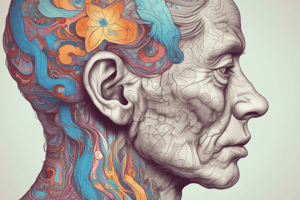Podcast
Questions and Answers
What percentage of dementia cases are accounted for by Alzheimer's disease?
What percentage of dementia cases are accounted for by Alzheimer's disease?
- 40-60%
- 60-80% (correct)
- 80-90%
- 20-40%
What is the primary cause of vascular dementia?
What is the primary cause of vascular dementia?
- Reduced blood flow to the brain (correct)
- Genetic mutations
- Infection
- Toxic substances
What is a common risk factor for dementia?
What is a common risk factor for dementia?
- Healthy diet
- Good sleep habits
- Social isolation (correct)
- Regular exercise
What is the main cognitive symptom of dementia?
What is the main cognitive symptom of dementia?
What is the name of the protein clumps found in the brain of people with Lewy body dementia?
What is the name of the protein clumps found in the brain of people with Lewy body dementia?
What is the estimated number of people living with dementia worldwide?
What is the estimated number of people living with dementia worldwide?
What is the name of the type of dementia caused by reduced blood flow to the brain?
What is the name of the type of dementia caused by reduced blood flow to the brain?
What is the age group with the highest risk of dementia?
What is the age group with the highest risk of dementia?
Study Notes
Definition and Epidemiology
- Dementia is a broad term that describes a group of symptoms, such as memory loss, confusion, and difficulty with communication and problem-solving.
- It is a neurodegenerative disorder that affects cognitive function and daily living activities.
- According to the World Health Organization (WHO), there are over 50 million people worldwide living with dementia, with numbers expected to triple by 2050.
Types of Dementia
- Alzheimer's disease: Most common type, accounting for 60-80% of cases, characterized by beta-amyloid plaques and neurofibrillary tangles in the brain.
- Vascular dementia: Second most common type, resulting from reduced blood flow to the brain, often caused by small strokes or vascular disease.
- Lewy body dementia: Characterized by abnormal protein clumps called Lewy bodies in the brain, leading to fluctuations in cognition and alertness.
- Frontotemporal dementia: A group of disorders affecting the front and temporal lobes, leading to changes in behavior, language, and movement.
- Other types: Mixed dementia, traumatic brain injury, and dementia caused by other medical conditions, such as Huntington's disease.
Risk Factors and Causes
- Age: Risk of dementia increases with age, with most cases occurring in people over 65.
- Genetics: Family history and genetic mutations can increase risk.
- Lifestyle factors: Physical inactivity, smoking, and social isolation may contribute to risk.
- Medical conditions: Diabetes, hypertension, and cardiovascular disease may increase risk.
Symptoms and Diagnosis
- Cognitive symptoms: Memory loss, confusion, difficulty with communication, problem-solving, and judgment.
- Non-cognitive symptoms: Mood changes, personality changes, and difficulty with daily living activities.
- Diagnosis: Based on medical history, physical examination, laboratory tests, and cognitive and behavioral assessments.
Treatment and Management
- Medications: Cholinesterase inhibitors, memantine, and combination therapies to manage symptoms.
- Non-pharmacological interventions: Cognitive training, behavioral therapy, and caregiver support.
- Lifestyle modifications: Encouraging physical activity, social engagement, and cognitive stimulation.
Definition and Epidemiology
- Dementia is a neurodegenerative disorder that affects cognitive function and daily living activities, characterized by symptoms such as memory loss, confusion, and difficulty with communication and problem-solving.
- There are over 50 million people worldwide living with dementia, with numbers expected to triple by 2050.
Types of Dementia
- Alzheimer's disease is the most common type, accounting for 60-80% of cases, characterized by beta-amyloid plaques and neurofibrillary tangles in the brain.
- Vascular dementia is the second most common type, resulting from reduced blood flow to the brain, often caused by small strokes or vascular disease.
- Lewy body dementia is characterized by abnormal protein clumps called Lewy bodies in the brain, leading to fluctuations in cognition and alertness.
- Frontotemporal dementia is a group of disorders affecting the front and temporal lobes, leading to changes in behavior, language, and movement.
- Other types of dementia include mixed dementia, traumatic brain injury, and dementia caused by other medical conditions, such as Huntington's disease.
Risk Factors and Causes
- The risk of dementia increases with age, with most cases occurring in people over 65.
- Family history and genetic mutations can increase the risk of dementia.
- Lifestyle factors such as physical inactivity, smoking, and social isolation may contribute to the risk of dementia.
- Medical conditions such as diabetes, hypertension, and cardiovascular disease may increase the risk of dementia.
Symptoms and Diagnosis
- Cognitive symptoms of dementia include memory loss, confusion, difficulty with communication, problem-solving, and judgment.
- Non-cognitive symptoms of dementia include mood changes, personality changes, and difficulty with daily living activities.
- Diagnosis of dementia is based on medical history, physical examination, laboratory tests, and cognitive and behavioral assessments.
Treatment and Management
- Medications used to manage dementia symptoms include cholinesterase inhibitors, memantine, and combination therapies.
- Non-pharmacological interventions for dementia include cognitive training, behavioral therapy, and caregiver support.
- Lifestyle modifications such as encouraging physical activity, social engagement, and cognitive stimulation can help manage dementia.
Studying That Suits You
Use AI to generate personalized quizzes and flashcards to suit your learning preferences.
Description
This quiz covers the definition, symptoms, and epidemiology of dementia, a neurodegenerative disorder that affects cognitive function and daily living activities.



